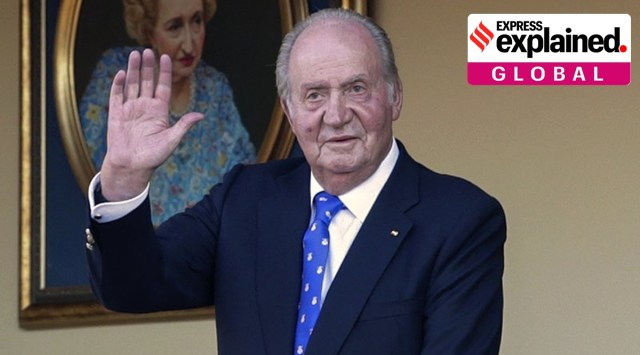Explained: Why a former monarch’s tax debts have caused a storm in Spain
The 83-year-old Spanish royal has seen his public image erode significantly in recent years, and had abdicated in 2014 to hand over the throne to his son, the current ruler King Felipe VI.
 Spain’s former King Juan Carlos I. (AP)
Spain’s former King Juan Carlos I. (AP)Spain’s ex-monarch Juan Carlos I, who has been in the UAE since August last year after being engulfed by a raft of scandals, has made a payment of close to 4.4 million euros to the country’s tax agency to try and prevent from being sued over his dues.
The 83-year-old Spanish royal has seen his public image erode significantly in recent years, and had abdicated in 2014 to hand over the throne to his son, the current ruler King Felipe VI.
The royal tax debt
The Spanish newspaper El País, which broke the story, reported on Friday that the emeritus king had made a second payment to tax authorities against undeclared income that he received over a number of years, within three months after making the first such deposit.
In a statement, his lawyer said that the voluntary tax settlement worth 4.4 million euros, which included interest payments and fines, were related to travel and other expenses paid by a foundation from which the ex-king benefitted, as per a Reuters report. The foundation, based in Liechtenstein, belonged to a distant cousin of Juan Carlos, and reportedly paid for private jet flights worth 8 million euros– counted as part of the former ruler’s taxable income.
According to El País, the first payment made in December was worth more than 678,000 euros including interest and fines, and was related to a probe by Spain’s attorney general investigating allegations of illegal credit card transactions made by the royal after his abdication in 2014 to accounts not in his name. As per the report, this payment meant an admission of fraud by the former king, but saved him from being charged for money laundering, thus removing the obstacles for his return to Spain.
Controversies involving the former king
Juan Carlos I, who was generally held in high regard for protecting Spain’s nascent democracy after the death of dictator Francisco Franco in 1975, saw his popularity decline due to a slew of scandals involving the royal family.
A controversial elephant-hunting trip to Africa in 2012, a time when Spain was reeling under economic distress, significantly damaged his reputation. His image also took a blow after reports emerged of an alleged extra-marital relationship with Corinna zu Sayn-Wittgenstein, a German businesswoman. These events are said to have led him to abdicate in 2014, giving the throne to son Felipe, who had a cleaner image.
His financial dealings are currently the subject of several other investigations, one of which is looking into alleged kickbacks worth $100 million received for building a high-speed train in Saudi Arabia. As head of state, Juan Carlos previously enjoyed immunity, but after abdication can potentially face prosecution.
In March last year, King Felipe VI renounced inheritance from Juan Carlos after the Saudi Arabia scandal broke, and stripped his father’s annual palace allowance of around 200,000 euros.
Other members of Spain’s royal family have also been mired in scams in the past. Juan Carlos’ daughter, Princess Cristina and her husband Iñaki Urdangarin were embroiled in controversy in 2016 after Urdangarin was convicted of embezzling around 6.2 million euros of public funds, and sent to jail. The princess lost her “Duchess of Palma” title during the inquiry, but was herself acquitted of wrongdoing.
How this can impact Spain’s government
The former king’s alleged financial impropriety is said to drive a wedge between Spain’s coalition government, in which the Socialists are sharing power with Podemos, a hard-left party that openly opposes the monarchy.
Socialist Prime Minister Pedro Sanchez has been cautious while commenting on the royal family. “Regarding uncivil behaviour, I feel the same rejection as the majority of Spanish citizens,” Sanchez said, but praised current monarch Felipe VI for his “exemplarity and transparency”.
Gerardo Pisarello, a Podemos parliamentarian, called it shameful that Juan Carlos I was “voluntarily paying the tax office millions which he should have declared years ago”. His party is now demanding legal changes to increase the state’s oversight over the throne.
- 01
- 02
- 03
- 04
- 05






































